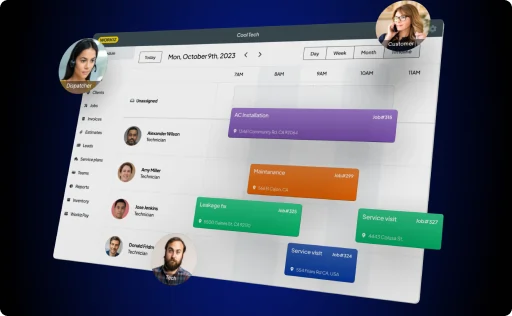There was a time when handing out company cell phones was the only way of ensuring your employees could be reached when they were on the road. That was back when cell phones were large, clunky, and owned by less than half the population.
Everything changed with the creation of the iPhone. Nowadays, roughly 90% of Americans aged 18-65 own a smartphone, and 98% have a cell phone of any kind. Service pros now have a choice between buying company phones vs. letting employees bring their own devices to work – and there are pros and cons to both.

Company phones: Pros and cons
✔ Compatibility. If you need your employees to use certain apps, such as one that tracks and records calls with customers, then it is essential that each of them has a compatible phone. Buying everyone a company phone gives you control over devices and features. You’ll never again need to worry about that one employee who insists on using an outdated flip phone.
✔ Monitoring. With company cell phones, you can find out what your employees are up to on the company dime. You can track their location and put limits on personal phone use. It’s perfectly normal for business owners to monitor employee phone usage during work hours – just be upfront about it in your company-provided cell phone policy.
✔ 24/7 access. If you run the sort of home service business that promises round-the-clock support, then it’s critical that your employees be contactable outside of regular hours. Buying everyone’s company phones is one way of getting that sort of commitment from your team.
X Upgrades. Apple and Samsung release new versions of the iPhone and Galaxy virtually every year, turning the old versions into scrap metal really quickly. Having to regularly upgrade multiple phones can get very expensive.
X Maintenance. If your business owns the phones, you are responsible for the maintenance costs. Plus, there’s always the risk of employees not taking care of company property.
X Inconvenience. Some employees might not like the idea of carrying around both a personal and work phone.
The Compromise – BYOD phone plans
Like many choices in business, there is a middle ground. In this instance, the compromise is a BYOD (Bring Your Own Device) phone plan. In all likelihood, each of your employees already owns a cell phone. Would any of them be against you paying for their plan?
BYOD phone plans come in two forms:
- Small business cell phone plan for all employees; or
- Reimburse each employee through their paycheck for business calls and data.
BYOD phone plans offer most of the same benefits as company-provided cell phones but few of the downsides. True, you won’t get to select the device, but you can do the following:
- Pick a cellular company that has coverage in the areas your business operates;
- Make sure each employee has enough talk, text, and data to do their job;
- Monitor employee internet and data usage;
- Get your employees to download apps that do useful things, like call tracking.
- If you choose to reimburse an employee for business use of a personal cell phone, that money is not taxable.
BYOD does raise the risk of an employee not keeping their personal phone in working order. Mind you, it’s only a small risk because most people can’t last 5 minutes without their phone. To be ready for an emergency situation, you may want to keep a couple of spare phones with SIM cards in the office.

Employee cell phone plans – What they must include for home service businesses
A business cell phone plan is about more than just keeping tabs on employees. You can turn your plan into a remote office phone system that connects you, your remote employees, and your customers.
The best cell phone plans for small businesses include:
-
Unlimited data:
Guarantees your employee can access all mobile features without limitations.
-
GPS:
There’s no need to fork out for expensive employee tracking systems when smartphone apps like Workiz offer GPS tracking.
-
Call tracking:
Track call information in real-time to see who’s on the phone, how many calls have come in, and how many customer calls have been answered or missed.
-
Call recording:
Record conversations between your employees and clients that you can listen back to later if any disputes arise.
-
Custom call flows:
Keep your calls organized and never miss an incoming call with call queues. Use an interactive voice response system to set up call routing and streamline your communication process.
-
Call masking
Ensure the privacy of both your customers and field technicians by using an alternative phone number or extension. This feature allows you to customize the caller ID displayed to your customers, replacing it with your business phone number or any other desired number. This helps to protect the personal information of both your customers and field techs.
-
Softphone:
Turns each employee’s personal phone into a business phone by letting them call client contacts from inside their Workiz app.
Verdict
As a service professional, it is essential for the success of your business that all employees have functioning phones. While it is not necessary to purchase new devices for each employee, you may want to consider consolidating their phone plans under a single provider.
This will give you more control over your business expenses and allow you to easily manage phone usage among your employees. Additionally, having all employees on the same phone plan can facilitate better communication and coordination within your team.
Ultimately, having control over your employee phone plans can help ensure the smooth operation of your business.









